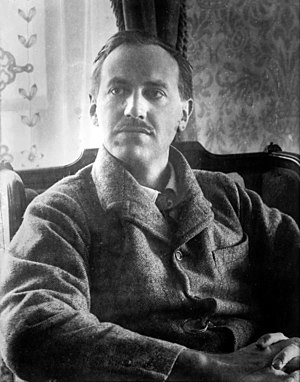 Image via Wikipedia Baron Edward John Moreton Drax Plunkett Dunsany is quite the mouthful. However, each of the tales in the novella sized collection of very short fiction, "Fifty-One Tales," can be found at Gutenberg.org.
Image via Wikipedia Baron Edward John Moreton Drax Plunkett Dunsany is quite the mouthful. However, each of the tales in the novella sized collection of very short fiction, "Fifty-One Tales," can be found at Gutenberg.org.The first story, "The Assignation," despite being about a page in length, really woke me up to the potential of this author. He makes a very short story applying anthropomorphism to the aspect of Fame. A poet who spends his life seeking fame, as he enters the final phase of his life, declares that Fame had forever remained elusive to him. She replies, "I will meet you in the graveyard at the back of the Workhouse in a hundred years." How cruel she is, yet how accurate a statement for the select few poets and artists she does visit well after life has expired.
The second story, "Charon," continues this encouragement. Extremely simple, a page really, where a man brought to the shore of Hades declares that he's the last passenger. Of course, that would mean that everyone is dead.
"The Hen" is an interesting narrative about the mixed perspective of reality between a hen who is always stuck in the same geography and swallows who fly south for winter. The hen refuses to believe the stories that they tell.
I'm not going to go through each of them. Just a few of the best that I ran into.
One such is a retelling of the common tale, "The Tortoise and the Hare." What's interesting about it is the punch line. That is to say, the race happens just as we remember in the customary tale. However, there is the second part. The tortoise and his followers all compliment him on his victory. But then there is a forest fire. They discuss who ought to warn the other animals about the impending danger. Since the tortoise is the fastest, it is said, he is sent. Then it is said that very few animals survived the fire. Of course, the implication is that when the need arose, the animal that was truly faster ought to have been the one to warn the others.
The next story that I really enjoyed is called "A Moral Little Tale." This is about a hard core Puritan who fought against those who danced, or laughed, or did any sort of merry making. Thus, when he dies, he expects to be greeted by God or Jesus. Rather, he is met by the Devil himself who then thanks him for all that he has done.
There are several other interesting tales throughout this short book of short stories. It is quite unique and ingenious. However, one should have full powers of concentration on these tales. It is quite easy to miss something that might be fundamental to the comprehension of the whole tale. Even so, several stories had me scratching my head, even after several rereads. In those cases, I'm not sure if I missed something, or if I'm looking for something that doesn't exist. In any case, I highly recommend these tales.

No comments:
Post a Comment